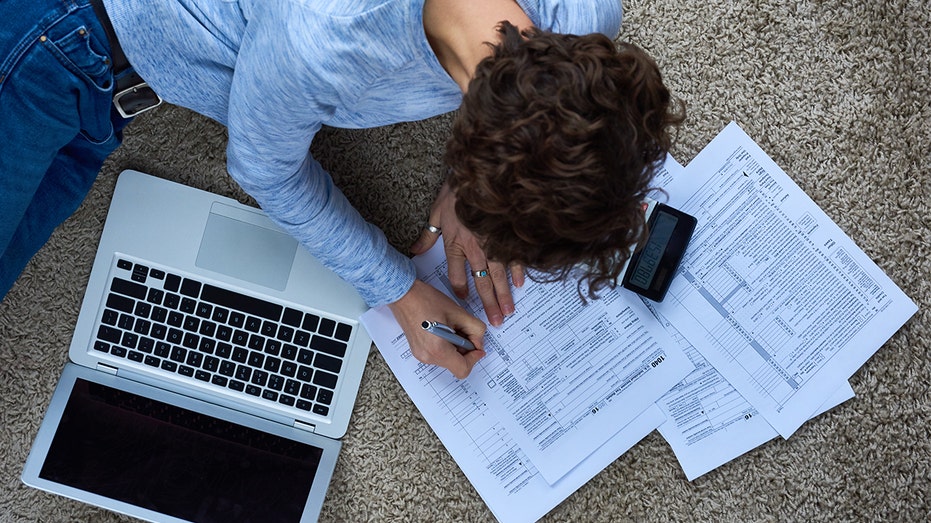Tax tips for freelancers: How to get ahead of tax season now
‘If you don’t get ahead of it, you could find yourself owing a lot of taxes’
If you’re a freelance or gig worker, don’t wait until January to start working on your taxes.
“You should see your accountant now, before the end of the year,” Paul Miller, the owner of New York City-based accounting firm Miller & Company, LLP, told FOX Business.
“A lot of people would tell you, you start preparing when you’re in tax season,” Miller added. “My answer to all of my clients is, 'I can’t help you for 2019 in 2020. I can help you now.' People should be preparing for their taxes in November and December … The new year is too late.”
TURBOTAX PARENT INVESTIGATED OVER TREATMENT OF LOW-INCOME TAXPAYERS: REPORT
It’s now -- not in January -- when freelance workers can make decisions that could “potentially change the impact on [their] tax return[s],” Miller said.

“If you don’t get ahead of it, you could find yourself owing a lot of taxes,” Miller warned.
If you’re not quite sure where to look or how to start preparing for a conversation with your accountant before Dec. 31, here are six other things to consider, according to Miller.
STUDENT LOAN RESCUE WON’T HURT TAXPAYERS: WHITE HOUSE
Prepare for Social Security taxes
For many people who are new to freelancing, tax season can be a bit of a shock because they aren’t prepared to pay Social Security taxes, Miller said.
“It’s not only income tax you’re paying. You’re also paying your Social Security tax,” he said.
“When you ultimately have to pay Social Security tax on $100,000 and you’re writing a check for $15,000 just for Social Security tax, it’s like sudden impact. It’s a lot,” Miller added.
In order to prepare, Miller said freelancers should make projections of income and expenses and make sure to set aside enough money for taxes based on that -- and try to mitigate those tax effects if they can.
Know what’s deductible
People who are new to freelancing often don’t know what’s deductible in order to fill out their Schedule C form, Miller said.
“A lot of accountants will give a client, if it's his first rodeo in doing a Schedule C, we can give him a template because a lot of people may not know what’s deductible,” Miller said.
“Even if we’re in the internet craze, a lot of people don’t have the bandwidth to read,” Miller added. “And this may not be their area of expertise. And getting in front of them and saying, this is what you have to think about, you have to put your mind into how do I pay less to the government? I have to have more business expenses. You have to capture those expenses.”
Try to lessen your tax burden before Dec. 31
Once freelancers know what’s deductible -- as long as they figure it out before the end of the year -- they can incur more expenses or defer income in order to lessen their tax burden, Miller said.
“We’re in a push-pull,” he said. “Is there any way you could pull in expenses and push out income. How can we defer getting our income?”
“You want that to be in the forefront of everybody’s mind,” he added. “I’d rather spend money than pay the government.”
Simplify your records
Even though taxes can get complicated, Miller said it is possible to simplify the process.
“Try to use one credit card that gives you a summary of the end of the year,” Miller said. “Try to use a debit card that gives you a summary statement, even if you have to pay for it at the end of the year.”
GET FOX BUSINESS ON THE GO BY CLICKING HERE
“Try to be consistent in using that credit card to pay all of your expenses. Try to use one dedicated bank account, just for your business expenses that has good online access,” he added.

Miller said that some banks and credit cards, like Chase Bank and American Express, allow you to export your statements into a spreadsheet, that you can just give to your accountant.
“I think that’s the simplest way in terms of record-keeping,” Miller said. “That would make your life a lot easier.”
Keep track of all your income -- and report it all
Miller said that one of the most common mistakes freelancers make is forgetting to report some of their income.
“Just because you didn’t get a 1099 doesn’t relieve you from the responsibility of reporting the income,” Miller said.
He said that even if you didn’t receive a 1099 from a client doesn’t mean the client didn’t send one to the government.
“A common cause of anxiety for people is [when] they get the fabulous letter from the IRS telling them they have an adjustment to their return,” he said. “I see that often. It’s very, very, very unsettling.”
“You’ve got to realize if the federal government makes a change to your return, New York state is going to make a change to your return,” he added. “So it’s a cascading problem. But that, I find, to be a very big problem for freelancers.”
Operate in the correct entity
One of the biggest things freelancers should consider is what entity they’re operating in, Miller said.
“A freelancer should consider, are they a Schedule C, should they incorporate? What state should I be doing business in?” Miller said.
CLICK HERE TO READ MORE ON FOX BUSINESS
“If you don’t ask the question, you don’t know,” he added. “I think the way you start your entity, you say, what entity should I choose? Is this the right entity for me? I need a tax consultation. I need to sit down and make sure that the way I’m operating, I’m operating in a manner than I’m maximizing my tax dollars and I’m in an entity that affords me the same deductions as I can get as if I’m a freelancer versus being in an S corporation or a C corporation. You know, there’s a lot of considerations that you have to think about. It’s not just a five-second question.”




















